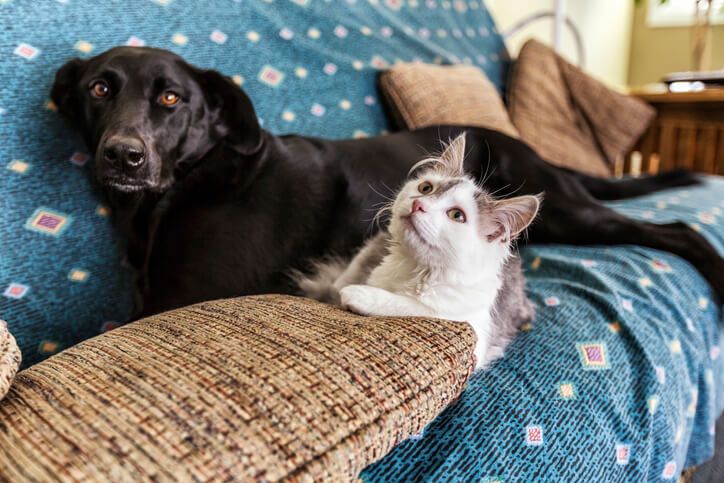If you’re planning on having a dog and a cat in the same house, you’ll understandably be worried about how they’re going to get on. Alternatively, if you’re already in that situation and they’re not getting on, you may be wondering what you can do about it.
This month, the team at Green Lane Farm is going to look at how to help cats and dogs in the same home become friends. But let’s start at the beginning.

Why do my cat and dog fight?
Films and cartoons – together with some experience from real life – may have led you to believe that cats and dogs are natural enemies. As it happens, there is some truth to it – but it’s more to do with their different personalities rather than any innate dislike of each other.
For instance, many dogs can be far too bouncy and inquisitive for the average cat, who is likely to lash out with its claws if approached too enthusiastically, especially by an unknown and overly excitable pooch. And sure as night follows day, if the cat scores a direct hit, the dog is understandably going to be a mite miffed and respond accordingly by going for the cat.
And once the cat starts running away, well, what’s a proud dog supposed to do other than assert its dominance and set off in pursuit? The inevitable result is a cartoon-style chase, the likes of which have been a mainstay of those aforementioned films and cartoons across the years…
How to make my cat and dog be friends
But it doesn’t have to be that way. It’s understandable when faced with the prospect of putting a cat and a dog together into one home, that you might be nervous about how they’re going to get on. And while they may not become the best of friends (although it’s not totally unheard of), they can at least learn to put up with each other. Here are a few tips:
Take your time
This shouldn’t really need saying, but don’t just throw a cat and a dog into a room together and expect them to get on. One good way to introduce them is by smell – for example, if they have some bedding they’ve been using, give it to the other ahead of a first meeting so that they’re already acquainted with the other’s scent.
First impressions
That first meeting needs to be well controlled, and they still don’t actually need to meet nose-to-nose. Feeding them at the same time, but on either side of the same closed door, means that they’ll associate something good – food – with the other, while also being fully aware of their presence thanks to their strong sense of smell.
Create safe spaces for your cat
Provide somewhere your cat can feel safe, whether that’s a room or other part of the house that the dog is not allowed in or a place it can’t get to, such as high surfaces the cat can look down from (its natural position, it might think). If you can, create the possibility for your cat to cross a room without even having to touch the floor, so that if it wants to go somewhere without interacting with the dog, it can.
Train your dog
Everyone knows that trying to train a cat to do anything is a waste of time. Dogs, on the other hand, can be trained, so in the same way some training aims to curb some of their less desirable behaviour, try to train your dog not to do anything it shouldn’t do to or around your cat.
Exercise your dog
Basically, a dog that’s good and tired after a long walk is far less likely to want to chase a faster and more nimble cat.
Start young
You can’t teach an old dog new tricks, while the more mature cat can also become set in his or her ways. So your best chance to make sure your cat and dog are friends is to introduce them to each other when they’re young. Don’t tell your dog this, but doing it this way is likely to allow the cat to naturally become the dominant one in the relationship, and that’s actually the best way to keep the peace.
Here at Green Lane Farm, we’re a home-from-home for both cats and dogs. But you don’t need to worry about them getting into fights with each other, because we keep them separate so that they’ll always feel totally comfortable when they’re staying with us.
We’re a popular place for pet owners in and around Chessington and Kingston in Surrey to leave their cats, dogs, rabbits, tortoises and other small animals when they’re away from home. Call us now to find out more or to book a stay for your own pet.




